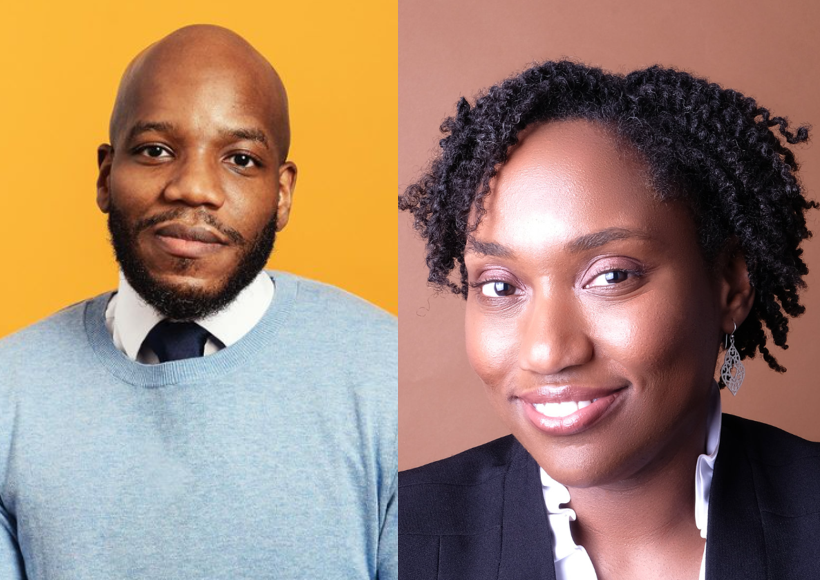The Georgetown-Howard Center for Medical Humanities and Health Justice (MHHJ), a partnership between universities to foster learning, research and engagement at the intersection of humanities and healthcare, welcomed award-winning historian Marcia Chatelain and NPR journalist Gene Demby to Georgetown University’s campus for a discussion about generational health memories and the potential of stories to improve health outcomes and counter injustices on March 26.
The talk, which was the center’s first public event since its inception in 2023, featured Chatelain, a professor of Africana studies at the University of Pennsylvania and former Georgetown professor of history and African American studies, and Demby, co-host of NPR’s “Code Switch,” a podcast about race and culture. The center’s executive directors, Lakshmi Krishnan and Dana Williams, focused the conversation around the center’s annual theme of lore, a term referring to the tradition of families and communities using stories to promote health and wellness.
Krishnan said the theme of lore captures the connection between humanities and medicine, which is exactly what the new center explores.
“What do the humanities have to say about medicine and why?” Krishnan asked the audience at the event. “The answers we found often took the form of a story: insights we had found as researchers in the archives, our family’s and our own experiences with healthcare, wisdom passed down by elders, readings of lit, hist, cult, narrative, threads that weave through medicine and health.”
Williams, a professor of African American literature and dean of Howard University’s graduate school, said stories can greatly influence people, she and wanted to create that influence in health lore through events like this.
“There are few things more powerful than stories — those we hear and those we know,” Williams wrote to The Hoya. “Stories govern our lives, the way we move in the world. So, we wanted people to think about stories that bend toward health justice.”
Chatelain said that growing up, powerful stories about a summer of extreme heat in her hometown of Chicago, during which many died without air conditioning, shaped her early views on health and reduced her community’s trust in government systems.
“The more vulnerable you were to relying on the state for something, the worse off you were going to be,” Chatelain said at the event. “These are health stories that change your relationship to a number of institutions, yet we don’t think of them as part of health history.”
Aditi Madhok, an attendee at the event, said she appreciated the speakers’ ability to address enormous issues like health injustice through storytelling.
“So much of our world comes in bite-sized information now,” Madhok told The Hoya. “These longer conversations need to be had to fully unpack and understand these issues.”
The speakers also considered how telling the full stories of health crises today can impact how people perceive them. For example, Demby discussed how menthol cigarette companies target advertisements toward Black communities, resulting in higher usage among Black Americans.
Demby said that while some people assume Black communities use menthol cigarettes purely by choice, deeper storytelling allows people to understand the historical and cultural background of this public health issue.
“You can’t just hit people with the facts,” Demby said. “If you’re trying to debunk a misconception, you actually have to tell a story.”
Chatelain said that she used the power of storytelling in her book, “Franchise: The Golden Arches in Black America,” to weave together the parallel narratives of how McDonald’s restaurants grew the wealth of Black franchisees while also worsening the health of the Black communities they served.
“When we shift our lens of storytelling to move away from your individual choices leading to community-wide disaster, ask, how did this become the common sense thinking?” Chatelain said.
According to Demby, the deeper understanding made possible through stories is vital for people to understand a health history. Referencing his work uncovering stories on “Code Switch,” Demby said he has observed that many people hold preconceptions about Black people’s health before understanding the full story.
“Many think that Black people have bad health outcomes because they make bad decisions,” Demby said. “It’s never that simple.”
Williams said she hopes that this outreach event and others will engage attendees in deep reflection on the importance of the medical humanities in their day-to-day lives.
“When we imagined our speaker series, we hoped to encourage everyone who attends one of these events to leave the space with more awareness of how the humanities improve the quality of our lives in a practical way daily,” Williams wrote.









